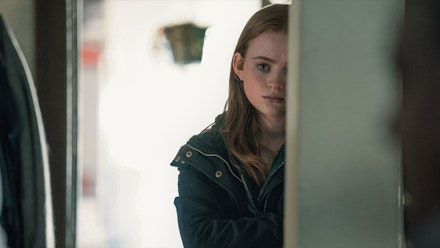Darren Aronofsky appears to be a director fascinated with extremity. With Black Swan, he depicted just how far someone can push themselves to achieve perfection. With Requiem For A Dream, it was the depths to which an addict can spiral. In The Whale, extremity is expressed through a man named Charlie (Brendan Fraser), who pushes human limits with his size and hermetic lifestyle. What’s interesting is that the most resonant parts of this film — and Charlie — aren’t found in the remarkable, but the mundane.

The headline, the audience draw, the thing to be ogled at, is Charlie’s physical form — delivered via relatively convincing (though still inherently dehumanising) prosthetics. He is very, very fat. His belly hangs over his trousers. His jawline disappears into his neck. He’s introduced via a squirm-inducing masturbation scene; we see his body exposed in the shower. Aronofsky’s direction — and Samuel D. Hunter’s script, adapted from his own play — shows a lot of compassion towards Charlie, but still can’t escape the impulse to use his size as a spectacle. His fatness is something to be judged, pitied, explained away, and while the supporting characters largely manage not to fall into those modes, the film itself does little to interrogate the real-world stigma that someone like Charlie faces, and how it would intensify his trauma, shame, and guilt.
What little fresh ground The Whale finds in its framing of fatness, it makes up for in its authenticity regarding the relentless, oppressive experience of disordered eating.
More compelling than Charlie’s body is his behaviour — his routine of ordering a pizza and hiding from the delivery man; pretending his webcam’s broken so his students don’t see him; self-destructive snacking habits that have little to do with food and everything to do with his feelings. What little fresh ground The Whale finds in its framing of fatness, it makes up for in its authenticity regarding the relentless, oppressive experience of disordered eating.
All that aside, it’s The Whale’s theatrical origin, and how that translates to a cinematic adaptation, that weighs it down the most. The single location is effective in conveying Charlie’s isolation, but the cold palette and lack of visual variety does eventually become stale. Time spent on do-gooder missionary Thomas’ (Ty Simpkins) side-plot feels wasted, and the fleshing out of his backstory is by far the least engaging thread.
The hero is, undoubtedly, Brendan Fraser. It’s impossible not to notice the thematic similarities between his experiences in (and withdrawing from) Hollywood and Charlie separating himself from the world. His screen presence injects much-needed empathy into this movie, adding lightness and innocence to a character comprised of polar opposites — Charlie is both selfless and selfish; incredibly optimistic about his daughter Ellie’s (a spiky, excellent Sadie Sink) potential but hopeless about his own; able to see his flaws but not take accountability for them. As emotionally challenging as this may have been for Fraser, seeing him given space to take on such a complex role in such a thoughtful, humane way is The Whale’s true triumph.



